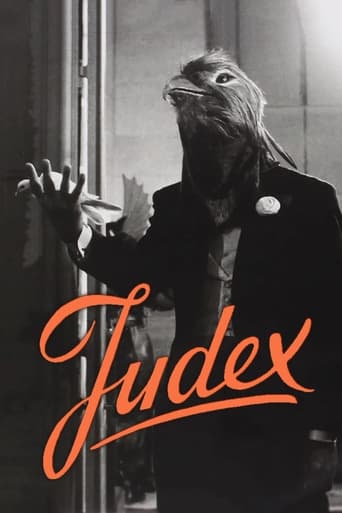Dalbert Pringle
The plain and obvious truth is - I just cannot get into French (nor Italian) films from the 1950s & 1960s.Believe me, I've tried my damnedest to learn to appreciate these pictures for what they're supposedly worth, but, time & again, French cinema just bores me something awful. And, I cannot, for the life of me, figure out why so many viewers seem prone to heap piles of praise on these films and give them unreasonably high ratings.If you ask me (considering all of the French films that I've watched in the past year), I'd say that this is certainly one nation of movie-makers who are almost clueless about producing really worthwhile and entertaining motion pictures.1963's Judex (directed by Georges Franju) is exactly the sort of "dullsville" French film-making that I'm ranting about here.Dry, drab and shallow - Judex contained awful violence, terrible acting, idiotic situations, and brain-dead dialogue, all wrapped up in an asinine tale concerning a bunch of bungling criminals who couldn't get the job done right even if their very lives depended upon it.At numerous times throughout its 90-minute running time I came mighty close to turning Judex right off, for good.And, that's that!
Igenlode Wordsmith
I haven't seen the original Judex, but I've seen Ultus, the equivalent British serial of the era... and I definitely recognise the style here. Multiple disguises, hairbreadth escapes from death, jawdropping coincidences, gadgetry and sleight of hand... and villains who never kill their victims when they ought to! The print in the BFI National Archive was in beautiful condition (save for some oversized and rather intrusive subtitling), and this film is visually and musically stunning; the Maurice Jarre soundtrack is lovely, fitting and eerie. The morality of the story -- despite its simplistic chase format -- is surprisingly grey, with Jacqueline the only pure innocent (and thus, alas, the least interesting character). It's hard not to sympathise with Favraux in his situation, despite everything that we learn, or with young Morales, caught between the ruthless woman he loves and his long-lost father, and Judex himself finds his self-appointed mission of punishment harder and harder to fulfil.Scenes like the masked ball (shrouded in almost surreal mystery, since it is not until afterwards that we have any idea what was going on!) and the spider-like climb of Judex' minions to the roof are very memorable, while the film also has a nice line in self-deflating humour, courtesy of the fiction-obsessed detective Cocantin and his rapport with small children. For such a preposterous comic-strip confection the plot holds together quite well, although having displayed such crowning ineptitude in their first attempt to kill Jacqueline (and what happened to the original idea of questioning her first?), it's hard to understand why the plotters don't just make away with her immediately the next time they get the opportunity! The one thing that really grated, as with all old historical dramas, was the very 'modern' hairstyles and make-up used on all the eye-candy characters in order to make them attractive to a contemporary 1960s audience -- the result now, of course, is that instead of appearing subconsciously appealing they appear distractingly out of period. It's hard to credit a swooning damsel of 1916 when she is made up to look more like Brigitte Bardot...Casting a professional magician as Judex enables the character to perform some impressive sleight-of-hand, and there are some subtle references to the original era, like the opening iris shot, the super-advanced (and supersized) antique surveillance gadgetry, and the title cards setting the various scenes. But perhaps the most impressive thing is that this is basically played entirely 'straight': it's not a tongue-in-cheek homage to pulp serials, it's presented in its own right as a piece of poetry for us to suspend disbelief -- a 1914 adventure of a mysterious caped avenger, an athletic, resourceful villainess, and a celestial innocent who sought to redeem her father's deeds.
Oslo Jargo (Bartok Kinski)
Preposterously inane film directed by Georges Franju, it barely reaches above average. There's no story, it's all just 'action' between the banker, a shadowy Judex, the banker's former governess and the banker's dull daughter. It's got some art leaning which saves it from tedium.It's a homage to Louis Feuillade who is known for the serials Fantômas, Les Vampires and Judex and his films made between 1904 and 1926.Also has an overblown fifty-minute program "Franju le visionnaire" where an overestimated and pretentious Georges Franju's bloats over his films, he even states that he "hates fairy tales because they 'bore' him". Well, I loved them as a kid. Anyone who didn't like fairy tales is a highfaluting snob I think.Still, it's a nice package put together by The Criterion Collection.
elis_jones
Georges Franju is an unfairly neglected director - overshadowed by Godard and Truffaut, he fell quickly out of favour as a filmmaker, although he is revered as co-founder, with Henri Langlois, of the Cinematheque Française in Paris shortly before World War 2.The influences to be seen in Franju's films are not those of New Wave directors: Hollywood film noir and trashy American novels. He is more in tune with German Expressionism and, as perhaps befits a film archivist, with silent cinema.So JUDEX is a very affectionate tribute to Louis Feuillade, and shares its title with a 1916 serial. As the title character Franju cast a magician - Channing Pollock - and other actors include the wonderful Edith Scob (unforgettable in Franju's EYES WITHOUT A FACE), Andre Melies (son of Georges) and Theo Sarapo (one-time lover of Edith Piaf). The music is by Maurice Jarre, and adds to the dreamlike nature of the whole story.JUDEX may not be a great film, but it is a truly wonderful film. Just let it wash over you, and the memory of it may haunt you for a surprisingly long time!



